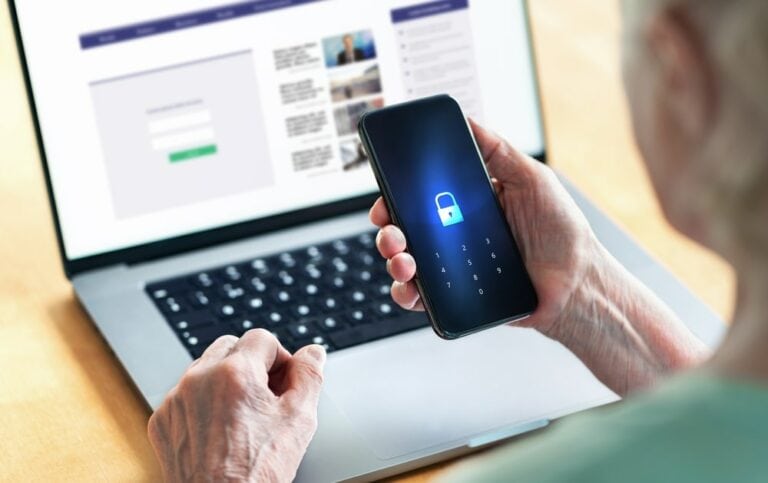“Digital Defenders: Seniors Take on Cybercrime!”
When it comes to cyber security for seniors, you must always be vigilant and wary.
A recent statistical study revealed that in 2023, individuals over the age of 60 comprised the largest group of recorded cyber crime victims in the United States. The latest data indicates that over 104,068 people reported cyber crimes during that year.
Indeed, the Internet opens up a world of possibilities for seniors to connect, learn, and stay engaged.
But it also opens the door to cybercriminals who lurk about and are ready to pounce on our innocent seniors.
Cybercriminals take advantage of seniors’ trusting nature and limited experience with online platforms.
We’ve discussed how to identify and avoid elder scams before, but in this blog we want to focus on cyber security for seniors – in the online dimension.
In this blog, we shed light on how these cybercriminals operate and how to keep your senior from falling victim to online scams and identity theft.
Here are ten tips to keep your seniors safe online.
10 Tips on Cyber Security For Seniors
First of all, it is important to know that these cybercriminals are clever, and they have tricks like phishing emails and fake phone calls to get you to reveal your personal information.
Don’t ever fall for it. Anytime you get a call requesting this information, hang up the phone!
1. EDUCATION:
Seniors need to stay informed about the common online scams and tactics that cybercriminals are using. These include everything form phishing emails to malicious websites. The senior community needs to be equipped with know-how and practical tips on how to be resilient against digital dangers.
2. VERIFY YOUR SOURCES:
Verifying the legitimacy of emails, websites, and phone calls before giving out any personal information is vital.
Seniors need to know to look for red flags like spelling errors, suspicious-looking email addresses or unsolicited requests for information.
3. KEEP PERSONAL INFORMATION SAFE:
Create strong passwords with a complicated mixture of letters, numbers , and symbols. It may be a pain, but it will keep you safe. Use different password for each different account. Also, look for websites that require two pieces of information to log in.

4. ONLY USE TRUSTWOTHY WEBSITES:
Check for https:// on a website. These websites have a closed padlock icon. In other words, these sites are secure, and your personal information will be encrypted. You should always use these trusted websites when you are shopping online.
5. REVIEW YOUR FINANCIALS REGULARLY:
Seniors should be encouraged to do a regular review of their financial statements and their credit reports to search for any suspicious activity. This can help to detect signs of identity theft early so that your senior can minimize any damage right away.
6. BE CAUTIOUS:
We cannot emphasize enough how important it is for seniors to remain ever cautious about who they are sharing personal information with when they are sharing it on the phone or online.
Sensitive data should only be shared with trusted sources and should never be shared on social media platforms.
Cybercriminals use information on social media for personalized scams.
7. USE THE “REPORT” OR” BLOCK” OPTIONS:
Whenever something seems a little off about a website or interaction, don’t hesitate to report or block it.
Be patient and take your time. Don’t rush in and give out your personal information or make a decision. Remember, if it seems too good to be true, it probably is!
8. USE A DEDICATED EMAIL ACCOUNT:
Use a dedicated email account for your online activities. It makes it easier to spot suspicious messages. Another option would be to consider using a reputable email service that offers spam filters and other security features.
9. STAY UPDATED:
It is important for your seniors to keep their devices, software, and security patches up to date in order to protect them against known vulnerabilities and exploits.
10. USE A VIRTUAL PRIVATE NETWORK (VPN):
It might be worthwhile to consider using a VPN whenever you are connecting go the internet, especially to your bank. It adds as extra layer of security for you by encrypting your internet connection and also by hiding your IP address. It’s a simple way to add extra protection against cyberthefts.
IN CONCLUSION
When it comes to cyber security for seniors, if you and your senior follow these tips, everyone will be safer online.
Keep staying informed because scams and threats can change all the time. Check in with trusted sources for the latest information on staying secure online.
If you’d like more information or help with any of the tips we discussed, all of us at Kabb Law are here to help with any additional information.
Call us at 216-991-5222.

